SHORESIDE: Without The Couch
The SHORESIDE: Without The Couch Podcast is where therapy stops sounding clinical and starts making sense.
Hosted by a therapist, practice owner, and late-diagnosed ADHD woman in midlife, this podcast dives into emotional regulation, relationships, burnout, boundaries, and identity shifts—without the couch, the clipboard, or the pressure to have it all figured out.
This is wellness that talks with you, not at you.
Episodes
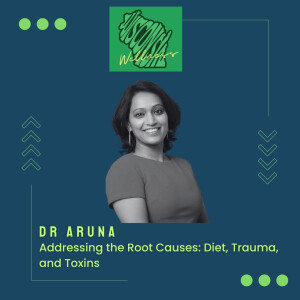
Friday Apr 26, 2024
Friday Apr 26, 2024
Join our NewsletterJoin our WWP Facebook group Free Workshops and WorksheetsDr. Aruna is a board-certified adult geriatric and holistic psychiatrist who helps her patients heal from mental and physical health conditions by addressing the root causes of wrong diet, trauma, and toxins. She shares her journey from growing up in India and studying psychiatry there to coming to the US and experiencing the differences in approach to mental health.Dr. Aruna emphasizes the importance of a holistic approach to psychiatry, incorporating nutrition and lifestyle changes and addressing the underlying physical health issues. She also discusses the need for a safe and accepting environment for individuals to be themselves and heal. Dr. Aruna Tummala discusses the connection between mental health and spirituality in this conversation. She shares examples of individuals who experienced psychosis and spiritual awakenings, highlighting the potential benefits of embracing these experiences rather than suppressing them.TakeawaysHolistic psychiatry addresses the root causes of mental and physical health conditions, including diet, trauma, and toxins.Creating a safe and accepting environment is crucial for individuals to heal and be themselves.The US healthcare system can be more focused on medication and less on addressing underlying physical health issues.A holistic approach to psychiatry includes nutrition, lifestyle changes, and addressing the whole person.Cultural differences in approaches to mental health can provide valuable insights and lessons. Psychosis can be viewed as a spiritual awakening rather than a mental illness, and embracing these experiences can lead to spiritual growth and comfort.Addressing root causes of mental health concerns, such as inflammation, toxicity, trauma, and nutritional deficiencies, is essential for healing and well-being.Dr. Tummala's comprehensive six-month program focuses on healing the body, mind, and soul through diet, detoxification, and self-awareness.Empowerment and self-compassion are key in the healing process, and individuals have the ability to create a life of their choosing.*Let Dr. Aruna know you heard her on WWP!Guest InformationAruna Tummala, MD, ABIHM CEO & Medical Director, Trinergy Health LLCPh: 262-955-6600website: www.trinergyhealth.comwebsite:www.psychiatry2.comSubstack:arunatummala.substack.comFacebook:Facebook.com/TrinergyHealthFacebook:Facebook.com/TrinergyAyurvedaTwitter:https://twitter.com/trinergy_healthInstagram:https://www.instagram.com/trinergyhealth/Youtube:https://www.youtube.com/channel/UC9XRgM7O5H28e8-Ogma-BtATiktok:tiktok.com/TrinergyhealthLinkedin:www.linkedin.com/in/aruna-md-holistic-psychiatrist1Our Sponsors:https://bodyhealthtechnologyllc.sjv.io/ZQW5JWIntroducing the pinnacle of relaxation the luxury massage chairs by Body Health Technology LLC. Where state-of-the-art meets ultimate comfort, designed just for you, the busy professional, parent, and health enthusiast.EquaLife: EquaLife is a premier provider of health and wellness services to individuals, families, employers, and rural communities through innovative programs. Our mission is to improve the quality of life for everyone we serve by providing access to comprehensive, high-quality care.Top 5 Books on Body and Mind ConnectionThe Body Keeps the Score: Brain, Mind, and Body in the Healing of TraumaSomatic Internal Family Systems Therapy: Awareness, Breath, Resonance, Movement and Touch in PracticeDAILY VAGUS NERVE EXERCISES: Learn How to Stimulate & Activate the Power of the Longest Nerve in our Body, Prevent Inflammation and Calm AnxietyApplied Polyvagal Theory in Yoga: Therapeutic Practices for Emotional HealthEnergy Medicine: Balancing Your Body's Energies for Optimal Health, Joy, and Vitality Updated and Expanded
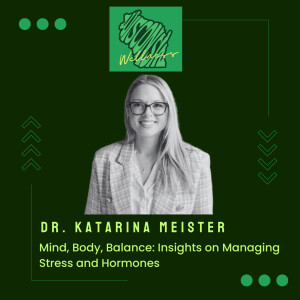
Friday Apr 19, 2024
Friday Apr 19, 2024
Join our NewsletterJoin our WWP Facebook group Free Workshops and WorksheetsDr. Katharina Meister discusses the connection between hormones and sleep, including the role of melatonin and sleep-related hormones. She emphasizes the importance of sex hormones in maintaining healthy sleep patterns and the impact of sleep deprivation on hormone regulation and overall health. Dr. Meister also highlights the role of exercise in hormonal regulation and sleep quality, as well as the connection between gut health and sleep. She provides advice on when to seek professional help for sleep disturbances and shares ongoing research and emerging trends in naturopathy. Finally, she offers actionable tips for optimizing hormonal balance. In this conversation, Katarina Meister discusses strategies for managing stress and optimizing hormonal health.She emphasizes the importance of incorporating restorative activities into daily routines and recommends a 3-2-1 exercise approach, consisting of three restorative activities, two weightlifting workouts, and one hour of walking or light cardio. Katarina also highlights the significance of nutrition in regulating cortisol levels and suggests including fiber, fat, and protein in meals. She provides tips for reducing sugar cravings and advises gradually reducing caffeine intake. Katarina explains the process of an initial consultation and the potential use of adaptogens and nutritional supplements to support hormonal balance. She also mentions the benefits of genetic testing for personalized medication response. The conversation concludes with a focus on establishing a routine and taking action steps such as walking and switching to green tea.TakeawaysIncorporate restorative activities into your daily routine to manage stress and optimize hormonal health.Follow the 3-2-1 exercise approach: three restorative activities, two weightlifting workouts, and one hour of walking or light cardio.Pay attention to nutrition by including fiber, fat, and protein in meals to regulate cortisol levels.Reduce sugar cravings by ensuring meals are balanced and gradually eliminating added sugars.Consider gradually reducing caffeine intake and switching to green tea for better cortisol regulation.Consult with a healthcare professional for an initial assessment and potential lab testing to identify hormonal imbalances.Explore the use of adaptogens and nutritional supplements to support hormonal balance.Consider genetic testing to understand personalized medication response.Establish a routine and hold yourself accountable to maintain healthy habits.Take action steps such as walking and switching to green tea to improve overall well-being.Lakeside Natural Medicinehttps://lakesidenaturalmedicine.com/practitioners/drmeister/Hooga: Red Light TherapyI am excited to partner with Hooga! 🌟 Explore their Red Light Therapy Devices for Pain Relief, Skin Health, Energy Boost, and Recovery. Let's boost wellness together! Use code Wisconsin12 for 12% offEquilifeGet A Free Bottle Of Gluten & Dairy Support On All Orders Over $149!Receive a FREE bottle of Gluten & Dairy Support Enzyme on all orders over $149! Intolerance and sensitivity to gluten and dairy are some of the most common digestive issues. Many of the highly processed packaged foods we buy at the grocery store contain difficult-to-digest gluten and dairy-based ingredients. Top 5 Books on Body and Mind ConnectionThe Body Keeps the Score: Brain, Mind, and Body in the Healing of TraumaSomatic Internal Family Systems Therapy: Awareness, Breath, Resonance, Movement and Touch in PracticeDAILY VAGUS NERVE EXERCISES: Learn How to Stimulate & Activate the Power of the Longest Nerve in our Body, Prevent Inflammation and Calm AnxietyApplied Polyvagal Theory in Yoga: Therapeutic Practices for Emotional HealthEnergy Medicine: Balancing Your Body's Energies for Optimal Health, Joy, and Vitality Updated and Expanded
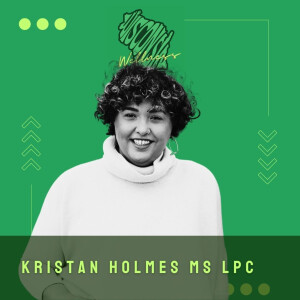
Friday Apr 12, 2024
Friday Apr 12, 2024
Join our NewsletterJoin our WWP Facebook group Free Workshops and WorksheetsIn this episode of the Wisconsin Wellness Podcast,Laurie Groh interviewsKristen Holmes, MS, LPC from Shoreside Therapies about Eye Movement Desensitization and Reprocessing (EMDR). EMDR is a therapeutic approach that helps individuals process traumatic experiences and reprocess memories. The bilateral stimulation used in EMDR helps calm the amygdala and allows the brain to access the right hemisphere, where processing and problem-solving occur. EMDR can be used to process past memories or to process distressing experiences in the present. The process of EMDR is similar to the brain's natural processing during REM sleep.Kristen shares her experience with EMDR and how it has changed her own life and her work with clients. EMDR therapy can be effective in processing distressing experiences and changing negative beliefs. It is not necessary to share every detail in therapy for EMDR to be effective.EMDR can provide relief and create positive changes in a shorter period of time compared to traditional talk therapy. It can be used to treat a wide range of issues, including trauma, anxiety, depression, OCD, personality disorders, substance use, and relationship problems.EMDR can be integrated with other therapeutic approaches, such as Internal Family Systems. It is important to note that EMDR may not be suitable for individuals with epilepsy or pregnant women in their second trimester.Kristen can be contacted through her website for more information and toschedule a consultation.TakeawaysEMDR is a therapeutic approach that helps individuals process traumatic experiences and reprocess memories.Bilateral stimulation in EMDR helps calm the amygdala and allows the brain to access the right hemisphere for processing and problem-solving.EMDR can be used to process past memories or to process distressing experiences in the present.The process of EMDR is similar to the brain's natural processing during REM sleep.EMDR has the potential to change lives and improve mental health outcomes. EMDR therapy can provide relief and create positive changes in a shorter period of time compared to traditional talk therapy.EMDR can be used to treat a wide range of issues, including trauma, anxiety, depression, OCD, personality disorders, substance use, and relationship problems.EMDR can be integrated with other therapeutic approaches, such as Internal Family Systems.Chapters00:00 Introduction to Kristen Holmes and EMDR17:18 EMDR 101: Eye Movement Desensitization and Reprocessing24:30 Observing and Processing: EMDR as a Therapeutic Approach32:22 Replacing Negative Beliefs with Positive Ones43:00 EMDR for Complex Trauma and Various Issues50:23 Contacting Kristen for EMDR TherapyOur SponsorsEquaLife:EquaLife is a premier provider of health and wellness services to individuals, families, employers, and rural communities through innovative programs. Our mission is to improve the quality of life for everyone we serve by providing access to comprehensive, high-quality care.Headspace: Stress and anxiety are common challenges in today's fast-paced world, and Headspace is there to help. This mindfulness and meditation app provides effective techniques to manage stress, promoting mental well-being.Top 5 Books on Body and Mind ConnectionThe Body Keeps the Score: Brain, Mind, and Body in the Healing of Traumaâ Somatic Internal Family Systems Therapy: Awareness, Breath, Resonance, Movement and Touch in Practiceâ DAILY VAGUS NERVE EXERCISES: Learn How to Stimulate & Activate the Power of the Longest Nerve in our Body, Prevent Inflammation and Calm Anxietyâ Applied Polyvagal Theory in Yoga: Therapeutic Practices for Emotional Health Energy Medicine: Balancing Your Body's Energies for Optimal Health, Joy, and Vitality Updated and Expanded
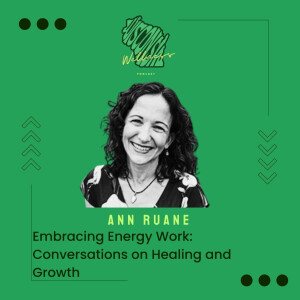
Friday Apr 05, 2024
Friday Apr 05, 2024
Join our NewsletterJoin our WWP Facebook group Free Workshops and WorksheetsThis podcast episode with hostLaurie Groh, MS LPC SASfeaturesAnn Ruane, who delves into her personal journey of becoming an energy healer, specifically focusing on Reiki, after her divorce. Initially seeking healing for herself, Anne recounts how a flyer led her to Reiki attunement and eventually to practice it professionally, moving away from being a full-time piano teacher. She shares insights into her learning experiences with Reiki, crystal healing, and integrated energy healing.Ann Ruane emphasizes the importance of recognizing and feeling emotions as a healing process, listening to one's body, and understanding the messages it conveys. She discusses the significance of creating a safe space for emotional expression and how physical discomfort can signal unaddressed emotions. The conversation also touches on the parallels between energy work and meditation, highlighting the therapeutic effects of expressing emotions and the power of self-compassion and acceptance. Anne provides her contact information for those interested in exploring energy healing further.00:00 Introduction to Ann's Journey into Energy Healing00:23 Discovering Reiki and Embracing Energy Work00:00 Introduction and Personal Experience with Equal Life01:25 Guest Introduction: Ann Rouen03:00 The Power of Energy Work and Listening to the Body06:19 Feeling is Healing: Embracing Emotions08:16 Energy Work and Meditation: Finding Inner Peace10:45 Self-Compassion: The Key to Healing and Self-Acceptance12:37 Listening to Your Body: Insights for Healing and Growth15:15 Overcoming Fear and Taking the Leap19:04 Out Loud Processing and Emotional Relief21:31 Differences Between Energy Work and Meditation23:24 Healing Physical Difficulties from Past Trauma24:48 Tears as the Body's Natural Reset26:15 Conclusion and Call to ActionConnect with our Guest:Ann Ruane's links:ann@luxeternahealing.comwww.LuxEternaHealing.comInstagramFacebookLinkedinAnn's Book:Fall in Love with the Whispers of Your Heart: A Guide to Transformation from the Inside OutOur Sponsors:We extend our heartfelt gratitude to our esteemed sponsors for their invaluable support. We deeply appreciate your contributions. Without further ado, we would like to present the esteemed list of our generous sponsors and the unwavering support of our community.EquaLife:EquaLife is a premier provider of health and wellness services to individuals, families, employers, and rural communities through innovative programs. Our mission is to improve the quality of life for everyone we serve by providing access to comprehensive, high-quality care.Headspace: Stress and anxiety are common challenges in today's fast-paced world, and Headspace is here to help. This mindfulness and meditation app provides effective techniques for managing stress and promoting mental well-being.Top 5 Books on Body and Mind ConnectionThe Body Keeps the Score: Brain, Mind, and Body in the Healing of TraumaSomatic Internal Family Systems Therapy: Awareness, Breath, Resonance, Movement and Touch in PracticeDAILY VAGUS NERVE EXERCISES: Learn How to Stimulate & Activate the Power of the Longest Nerve in our Body, Prevent Inflammation and Calm AnxietyApplied Polyvagal Theory in Yoga: Therapeutic Practices for Emotional HealthEnergy Medicine: Balancing Your Body's Energies for Optimal Health, Joy, and Vitality Updated and Expanded
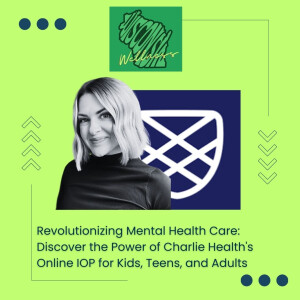
Wednesday Apr 03, 2024
Wednesday Apr 03, 2024
Join our Newsletter Join our WWP Facebook group Free Workshops and WorksheetsThis Episode hosted by Laurie Groh, MS LPC SAS, features a detailed explanation of Intensive Outpatient Programs (IOP) and focuses explicitly on Charlie Health's virtual IOP offerings. Calla, a representative from Charlie Health, outlines how their IOP serves as a middle tier of mental health treatment, offering a step up from individual therapy and a step down from hospitalization, catering to individuals aged 11 to 34 with a special maternal mental health track up to age 40. The program includes three-hour sessions three times a week, individual therapy, and optional family therapy, tailored to support diverse family dynamics and cultural sensitivities. The conversation highlights the ease of access to virtual care, tailored treatment through curated groups (including support for veterans, neurodivergent individuals, and various minority communities), and comprehensive discharge planning to ensure ongoing support. The virtual format particularly addresses barriers such as social anxiety and agoraphobia, facilitating engagement in a comfortable and timely manner. Furthermore, it discusses the broad demographic coverage across 30 states, the variety of insurances accepted, and the proactive engagement strategy for admission. Success stories and quotes from program participants underscore the positive impact of Charlie Health's services.Chapters00:00 Understanding IOP Programs with Charlie Health00:52 The Virtual Advantage of Charlie Health's IOP01:30 Expanding Support: Age Groups and Special Tracks02:45 Curated Group Sessions: Tailoring Therapy to Individual Needs03:42 The Admission Process: How to Join Charlie Health's IOP06:23 Holistic Therapy: Beyond Traditional Talk Therapy08:41 Safety and Support: Addressing Crisis in Virtual IOP10:03 Accessibility and Expansion: Charlie Health's Reach11:46 Success Stories and the Impact of Charlie Health13:27 Overcoming Barriers: Privacy and Matching in Virtual IOP15:27 The Future of Mental Health Support and Charlie HealthCharlie Health's virtual IOP The program includes three-hour sessions three times a week, individual therapy, and optional family therapy, tailored to support diverse family dynamics and cultural sensitivities. The conversation highlights the ease of access to virtual care, tailored treatment through curated groups (including support for veterans, neurodivergent individuals, and various minority communities), and comprehensive discharge planning to ensure ongoing support. Episode Sponsors and links:Shoreside Therapies: Shoreside Therapies offers compassionate, client-focused counseling for individuals, couples, and families. With expertise in mood disorders, life transitions, grief, trauma, and maternal mental health, their dedicated therapists provide a safe space to support your journey toward meaningful change and personal growth.Positive Parenting SolutionsIn Less Than 60 Minutes, You'll Have My Proven Playbook To POSITIVELY Fill Your Child's TWO Core Needs And Have Them Accept Consequences With No Nagging, Yelling, Or Pushback…Click here for the free webinarLaurie's Top 5 Parenting Book Recommendations: "Parenting from the Inside Out: How a Deeper Self-Understanding Can Help You Raise Children Who Thrive" by Daniel J. Siegel and Mary Hartzell "The Whole-Brain Child: 12 Revolutionary Strategies to Nurture Your Child's Developing Mind" by Daniel J. Siegel and Tina Payne Bryson "How to Talk So Kids Will Listen & Listen So Kids Will Talk" by Adele Faber and Elaine Mazlish "Simplicity Parenting: Using the Extraordinary Power of Less to Raise Calmer, Happier, and More Secure Kids" by Kim John Payne and Lisa M. Ross "No-Drama Discipline: The Whole-Brain Way to Calm the Chaos and Nurture Your Child's Developing Mind" by Daniel J. Siegel and Tina Payne Bryson
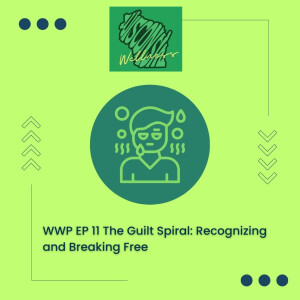
Friday Mar 22, 2024
Friday Mar 22, 2024
Join our Newsletter Join our WWP Facebook group Free Workshops and WorksheetsIn this episode, Laurie discusses parental guilt and how to overcome it. She explores the definitions of guilt and shame, debunking myths and providing insights into healthy parenting. Laurie emphasizes the importance of setting realistic expectations, communicating openly with children, and seeking support. By treating oneself with compassion and focusing on quality time over quantity, parents can reduce guilt and shame and create a healthier and happier family life.TakeawaysGuilt is a healthy emotion that arises when one perceives a violation of internalized moral standards.Shame is a fear state that arises from making a connection between a specific incident and one's identity.Good parents do feel guilt, but it becomes unhealthy when it turns into shame.Perfect parenting is a myth, and striving for perfection only sets unrealistic expectations.Treating oneself with compassion, setting realistic expectations, and seeking support can help overcome parental guilt and shame.Chapters00:00 Introduction00:32 Talking about Guilt05:22 Definition of Guilt06:21 Guilt vs. Shame13:03 Feeling Guilty for Losing Temper14:24 Understanding Shame22:03 Myth: Shame is an Effective Parenting Tool26:18 Myth: Perfect Parenting Prevents Guilt and Shame32:16 Setting Realistic Expectations37:01 Quality Time over Quantity40:23 Treating Yourself with Compassion45:18 ConclusionEpisode Sponsors and links:VitalMinds Counseling: Book a free 15-minute consultation online and get into therapy within a week!Free Workshops and WorksheetsHooga: Red Light TherapyI am excited to partner with Hooga! 🌟 Explore their Red Light Therapy Devices for Pain Relief, Skin Health, Energy Boost, and Recovery. Let's boost wellness together! Use code Wisconsin12 for 12% offEquilifeGet A Free Bottle Of Gluten & Dairy Support On All Orders Over $149!Receive a FREE bottle of Gluten & Dairy Support Enzyme on all orders over $149! Intolerance and sensitivity to gluten and dairy are some of the most common digestive issues. Many of the highly processed packaged foods we buy at the grocery store contain difficult-to-digest gluten and dairy-based ingredients. There are also times when eating these difficult to digest foods is impossible to avoid. Gluten and Dairy Support Enzyme provides a powerful blend of enzymes that helps your body process and digest challenging foods, reducing GI distress.Positive Parenting SolutionsIn Less Than 60 Minutes, You'll Have My Proven Playbook To POSITIVELY Fill Your Child's TWO Core Needs And Have Them Accept Consequences With No Nagging, Yelling, Or Pushback…Click here for the free webinarLaurie's Top 5 Parenting Book Recommendations: "Parenting from the Inside Out: How a Deeper Self-Understanding Can Help You Raise Children Who Thrive" by Daniel J. Siegel and Mary Hartzell "The Whole-Brain Child: 12 Revolutionary Strategies to Nurture Your Child's Developing Mind" by Daniel J. Siegel and Tina Payne Bryson "How to Talk So Kids Will Listen & Listen So Kids Will Talk" by Adele Faber and Elaine Mazlish "Simplicity Parenting: Using the Extraordinary Power of Less to Raise Calmer, Happier, and More Secure Kids" by Kim John Payne and Lisa M. Ross "No-Drama Discipline: The Whole-Brain Way to Calm the Chaos and Nurture Your Child's Developing Mind" by Daniel J. Siegel and Tina Payne Bryson
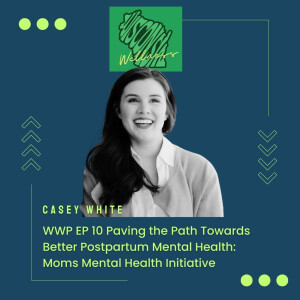
Thursday Mar 14, 2024
Thursday Mar 14, 2024
Join our Newsletter Join our WWP Facebook group Free Workshops and WorksheetsThe discussion with Laurie Groh MS LPC SAS and Casey White centers around the Moms Mental Health Initiative started in 2016 by two moms who faced their own struggles in the perinatal mental health journey. The initiative helps mothers navigate perinatal mood and anxiety disorders through peer support and resource brokering to bridge the gap to evidence-based treatment. The discussion also highlights the importance of treating intrusive thoughts correctly, the significance of peer support among mothers, and the harm of societal pressures on mothers. Critical to the initiative is breaking down barriers to mental health and navigating the complexities of postpartum treatment and support.00:00 Introduction and Overview of Moms Mental Health Initiative00:10 The Birth of Moms Mental Health Initiative00:51 The Role of Peer Support in Mental Health02:37 Understanding Intrusive Thoughts05:31 The Importance of Peer Support Groups07:58 The Role of Providers in Mental Health Support15:03 Addressing the Stigma Around Mental Health20:01 The Importance of Evidence-Based Treatment24:39 The Periscope Project: A Resource for Providers29:28 Recommended Resources for Moms30:12 Conclusion and Contact InformationMom’s Mental Health InitiativeIf you’re a mom suffering from anxiety and/or depression during pregnancy or after childbirth, you’re not alone. Moms Mental Health Initiative is a nonprofit organization dedicated to helping moms navigate perinatal mood and anxiety disorders by sharing information, connecting them to resources and providing peer-driven support.The Periscope Project The Periscope Project is a free resource for health care providers caring for pregnant and postpartum women in Wisconsin who are struggling with mental health or substance use disorders.Recommended Books on Postpartum: Good Moms Have Scary Thoughts: A Healing Guide to the Secret Fears of New MothersThe Fourth Trimester: A Postpartum Guide to Healing Your Body, Balancing Your Emotions, and Restoring Your Vitality Visit our Sponsors:Hooga: Red Light TherapyI am excited to partner with Hooga! 🌟 Explore their Red Light Therapy Devices for Pain Relief, Skin Health, Energy Boost, and Recovery. Let's boost wellness together! Use code Wisconsin12 for 12% offEquilifeGet A Free Bottle Of Gluten & Dairy Support On All Orders Over $149!Receive a FREE bottle of Gluten & Dairy Support Enzyme on all orders over $149! Intolerance and sensitivity to gluten and dairy are some of the most common digestive issues. Many of the highly processed packaged foods we buy at the grocery store contain difficult-to-digest gluten and dairy-based ingredients. There are also times when eating these difficult to digest foods is impossible to avoid. Gluten and Dairy Support Enzyme provides a powerful blend of enzymes that helps your body process and digest challenging foods, reducing GI distress.Positive Parenting SolutionsIn Less Than 60 Minutes, You'll Have My Proven Playbook To POSITIVELY Fill Your Child's TWO Core Needs And Have Them Accept Consequences With No Nagging, Yelling, Or Pushback…Click here for the free webinarLaurie's Top 5 Parenting Book Recommendations: "Parenting from the Inside Out: How a Deeper Self-Understanding Can Help You Raise Children Who Thrive" by Daniel J. Siegel and Mary Hartzell "The Whole-Brain Child: 12 Revolutionary Strategies to Nurture Your Child's Developing Mind" by Daniel J. Siegel and Tina Payne Bryson "How to Talk So Kids Will Listen & Listen So Kids Will Talk" by Adele Faber and Elaine Mazlish "Simplicity Parenting: Using the Extraordinary Power of Less to Raise Calmer, Happier, and More Secure Kids" by Kim John Payne and Lisa M. Ross "No-Drama Discipline: The Whole-Brain Way to Calm the Chaos and Nurture Your Child's Developing Mind" by Daniel J. Siegel and Tina Payne Bryson
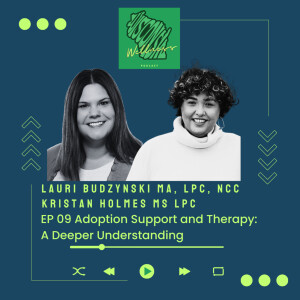
Thursday Mar 07, 2024
Thursday Mar 07, 2024
Join our Newsletter Join our WWP Facebook group Free Workshops and WorksheetsLauri Budzynski, MA, LPC, NCC , and Kristen Holmes, MS, LPC, therapists at Shoreside Therapies specializing in adoption and foster care services, share their experiences and insights working with adoptive families, adopted individuals, and foster parents. They shed light on the unique challenges associated with adoption, including attachment trauma, identity formation, behavioral issues, and the grieving process that arises from separation from birth parents. The therapists discuss the frequent misdiagnoses, such as ADHD, that adopted children might receive due to trauma rather than focusing on the underlying attachment issues. They highlight the concept of ambiguous loss and how it impacts both adoptees and parents, advocating for a supportive and safe space to explore these complex feelings. Lauri and Kristen highlight the importance of adopting competent therapy and asking the right questions for effective assessment. They also announce an upcoming virtual adoption support group aimed at fostering community, support, and camaraderie for adoptive and foster parents and providing resources for navigating various aspects of adoption. The discussion resonates with the importance of building understanding, empathy, and support around adoption and foster care.Takeaways Adoption work involves addressing the challenges of identity formation, attachment trauma, and ambiguous loss. Support groups can provide a safe space for adoptive parents to share their experiences and seek support. Understanding the unique needs and experiences of adoptees is crucial for adoption-competent therapy. Transracial adoption requires open conversations about culture, ethnicity, and identity. Workshops and support groups can provide valuable guidance and resources during transitions. Building a support system is crucial for adoptees and their families, and accessing resources such as IEPs and 504 plans can be beneficial. Support groups like Shoreside Therapies are not limited to Milwaukee County and can provide virtual support to individuals across Wisconsin. To learn more about the services and support offered by Shoreside Therapies, visit their website or contact them directly.00:00 Introduction to Equal Life01:09 Welcome to the Wisconsin Wellness Podcast01:36 Discussion on Adoption and Foster Care03:44 Understanding Adoption Competency09:50 Exploring Identity Issues in Adoption13:10 Understanding Ambiguous Loss and Grief23:39 Introduction to the Adoption Support Group29:24 Conclusion and Contact Information30:06 Outro and Final ThoughtsEpisode Sponsors and links:This episode is brought to you by:EquaLife: EquaLife is a premier provider of health and wellness services to individuals, families, employers, and rural communities through innovative programs. Our mission is to improve the quality of life for everyone we serve by providing access to comprehensive, high-quality care.Positive Parenting SolutionsIn Less Than 60 Minutes, You'll Have My Proven Playbook To POSITIVELY Fill Your Child's TWO Core Needs And Have Them Accept Consequences With No Nagging, Yelling, Or Pushback…Click here for the free webinarHeadspace: Stress and anxiety are common challenges in today's fast-paced world, and Headspace is there to help. This mindfulness and meditation app provides effective techniques to manage stress, promoting mental well-being.Shoreside Therapies Kristen and Lauri's Adoption Group:Adoption Support GroupReferenced Adoption Book:The Primal Wound
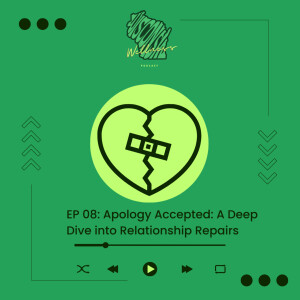
Thursday Feb 29, 2024
Thursday Feb 29, 2024
Join our Newsletter Join our WWP Facebook group Free Workshops and WorksheetsIn this episode of the Wisconsin Wellness Podcast, Laurie Groh, MS LPC SAS , discusses the importance of apologizing and making reparations within relationships. She highlights some common reasons why individuals may avoid apologizing and provide numerous strategies to apologize effectively. She touches on different types of apologies, such as sincere, conditional, non-apologies, and over-apologies. Lori also talks about understanding the difference between one's intent and their impact. Additionally, she suggests several key questions in interpersonal conversations when someone has been hurt. Lastly, she addresses ways to handle situations where one does not believe they did anything wrong. The episode emphasizes the critical role of apologies and making reparations in maintaining healthy relationships and preventing conflicts from leading to a toxic environment.TakeawaysApologies and repairs are fundamental parts of a healthy and fulfilling relationship.Understanding the reasons why people may struggle with apologizing can help cultivate compassion and empathy.Sincere apologies focus on the impact of one's actions and include action items for improvement.Engaging in deeper conversations and asking specific questions can facilitate understanding and make amends.Chapters00:00 Introduction: Importance of Apologies and Repairs in Relationships01:21 The Rhythm of a Relationship03:05 Reasons for Not Apologizing04:29 The Power of Shame05:17 Fear and Blaming06:11 Desire to Maintain Control07:09 Ego Protection08:04 Defensiveness08:34 Overcoming Apology Challenges09:30 Impact vs Intention10:00 Questions to Ask When Apologizing13:49 Importance of Apologies and Repairs in Relationships14:47 Types of Apologies18:01 Over-Apologizing19:00 Not Apologizing When Feeling Hurt20:29 Phrases to Use When Not Ready to Apologize20:59 ConclusionThis episode is brought to you by:Shoreside Therapies : Book an online therapy appointment and get into therapy within a week! Shoreside Therapies offers compassionate, client-focused counseling for individuals, couples, and families. With expertise in mood disorders, life transitions, grief, trauma, and maternal mental health, their dedicated therapists provide a safe space to support your journey toward meaningful change and personal growth.Free Workshops and WorksheetsMICHAEL PHELPS cold tub:Chilly GOAT Cold Tubs provide a refreshing and effective way to enhance recovery and improve overall health. Perfect for athletes or anyone looking to boost circulation and reduce inflammation, these cold tubs bring the power of hydrotherapy to your home.OMGyes Get your unlimited lifetime access to this groundbreaking material at the best prices available.GET YOUR UNLIMITED ACCESS TODAY!Laurie's Top 5 Recommended Books on Relationships: Attached The Seven Principles for Making Marriage Work The New Rules of Marriage Getting the Love You Want: A Guide for Couples Hold Me Tight: Seven Conversations for a Lifetime of Love
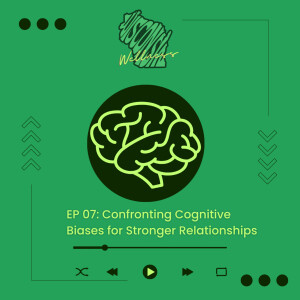
Friday Feb 23, 2024
Friday Feb 23, 2024
Join our NewsletterJoin our WWP Facebook groupFree Workshops and WorksheetsIn this episode of the Wisconsin Wellness Podcast, host Laurie Groh explores how cognitive biases might detrimentally affect personal relationships. Discussed biases include negativity bias, confirmation bias, and the priming effect. Laurie describes how these biases are deeply ingrained in human nature because of their adaptive significance in survival. However, they can obstruct the perception of reality within interpersonal dynamics, especially romantic partnerships, leading to misunderstandings and conflicts. Groh suggests recognizing and challenging these biases as a way to improve relationships. She supports her discussion with relevant examples and research studies, as well as an exercise to illustrate how biases influence perception. Also, the podcast underscores the necessity for self-love and communication in a relationship.00:00 Introduction and Welcome to the Podcast00:39 Understanding How Your Brain Can Hinder Your Relationships01:06 Exploring Cognitive Biases and Their Impact on Relationships02:16 The Halo Effect: How Attractiveness Influences Our Perceptions06:51 The Negativity Bias: How Our Brains Are Wired for Survival07:52 Overcoming the Negativity Bias Through Gratitude and Positivity09:14 The Confirmation Bias: How Our Beliefs Influence Our Perceptions13:56 The Priming Effect: How Anticipation Influences Our Reactions18:08 Personal Story: A Real-Life Example of Cognitive Biases in Relationships23:24 Conclusion: Recognizing and Challenging Cognitive BiasesShoreside Therapies: Shoreside Therapies offers compassionate, client-focused counseling for individuals, couples, and families. With expertise in mood disorders, life transitions, grief, trauma, and maternal mental health, their dedicated therapists provide a safe space to support your journey toward meaningful change and personal growth.OMGyes Get unlimited lifetime access to this groundbreaking material at the best prices.GET YOUR UNLIMITED ACCESS TODAY!Laurie's Top 5 Recommended Books on Relationships: Attached The Seven Principles for Making Marriage Work The New Rules of Marriage Getting the Love You Want: A Guide for Couples Hold Me Tight: Seven Conversations for a Lifetime of Love








